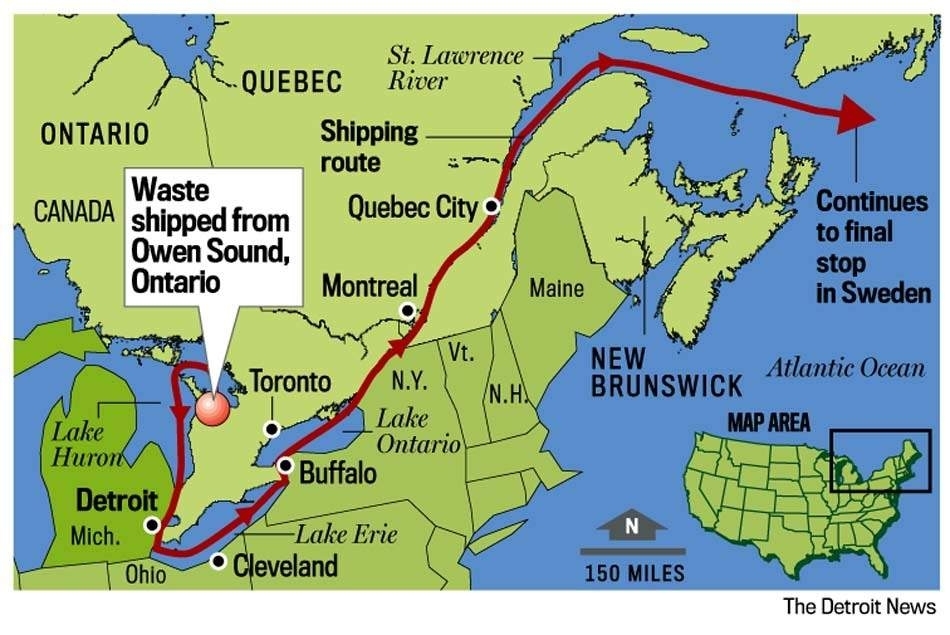The Mohawk Councils of Kahnawà:ke, Tyendinaga and Akwesasne have issued a jointed statement rejecting the planned shipment of nuclear waste through the Great Lakes and St. Lawrence Seaway system.
(Intercontinental Cry) “We wish to make it clear that we are absolutely, 100% against this plan,” states Tyendinaga Grand Chief Don Maracle, in the joint statement issued Feb. 9. “We have an obligation to protect Mother Earth and her inhabitants. We would be derelict in our duties if we turned a blind eye to this dangerous plan.”
Bruce Power–a “Canadian business partnership” between Cameco, TransCanada and others–wants to send a total of 16 generators filled with radioactive waste to Sweden where it can be recycled. However, before it can get there, the waste would travel “from Lake Huron, down the St. Clair River through to Lake Erie, Lake Ontario and then on through the St. Lawrence Seaway to the Atlantic Ocean,” notes APTN.
On Feb. 4, the Canadian Nuclear Safety Commission (CNSC), demonstrating how little it cares about Canadian Laws, gave Bruce power one full year to get the generators to Sweden.

Though Sweden itself turns out to be far from neutral when it comes to Canada’s nuclear industry, the Mohawks’ concerns hit much closer to home.
“The St. Lawrence River provides drinking water to some 40 million people,” says Kahnawà:ke Grand Chief Michael Ahrihron Delisle, Jr. “But for us, it’s much more than that. If there is an accident, there is no place for us to go. This is our home. We cannot and will not tolerate the passage of nuclear waste through our Territory. There is no excuse for this to take place.”
The Mohawk people have been living in the area of the St. Lawrence River for at least 9,000 years – and they’re still there today.
“It is disturbing that the CNSC has placed the interest of Bruce Power before the concerns shared by our Mohawk brothers and sisters,” says Akwesasne Grand Chief Mike Kanentakeron Mitchell. “We were never consulted even though the shipment is planned to pass through our territorial waters. As a result, we condemn the Commission for disregarding our concerns and our desire to protect our great waterway for future generations.”
The joint statement concludes, “We strongly urge the Commission to consider alternative plans to dispose or store the nuclear waste. Our three communities have pledged to work together to ensure the safety of Canadian, American and Indigenous people in this matter.”
In addition to the three Mohawk communities, the Anishinabek Nation, which represents 39 communities across Ontario, has issued its own statement against the plan; because it violates Canada’s “rule of law”.
“The Supreme Court has stipulated the requirement for consultation and accommodation with First Nations,” states Grand Council Chief Patrick Madahbee. “First Nations have to be accommodated on activities that could have an impact on our traditional territories. The United Nations Declaration on the Rights of Indigenous Peoples says handling of hazardous materials in our territories requires our free, prior, and informed consent.”
“The Great Lakes were never negotiated by treaty and we have inherent and treaty rights to all our waterways. Neither the Nuclear Safety Commission nor Bruce Power can guarantee that a disaster will not happen with this shipment. The spillage of any hazardous waste would infringe on our constitutionally-protected rights to fish, hunt, and gather lake-based traditional foods and medicines.”
Thankfully, the Anishinabek and the Mohawks aren’t alone. Several non-government organizations are also opposed to the plan, along with U.S. Republican Rep. Candice Miller and The Great Lakes and St. Lawrence Cities initiative, which represents 73 cities on both sides of the border.


